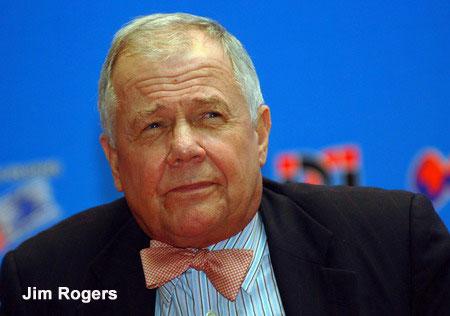 American investment guru Jim Rogers has debunked contrarian investor James S Chanos suggestions that China's investment bubble may lead to a Dubai-style implosion.
American investment guru Jim Rogers has debunked contrarian investor James S Chanos suggestions that China's investment bubble may lead to a Dubai-style implosion. Rogers said the Chinese economy is not in any imminent threat of collapse, and investors and companies are wise to stay involved with it.
"It is absurd to say China is in a bubble when the stock market is 50 to 60 percent below its all-time high. If you have a bubble you have things going through the roof. You have everybody screaming fire every day," he said.
Chanos, a hedge fund investor who predicted the collapse of Enron, said speculation in China's real estate sector was 1,000 times worse than Dubai.
"His remarks show a lack of understanding about Dubai and of China. Dubai's economy is built on real estate speculation, whereas China's is not. It is just part of the Chinese economy," said Rogers.
He, however, warns that the world could be heading again for 1970s-style inflation.
Rogers, 67, lives in Singapore and is the co-founder of the Quantum Fund along with noted investor George Soros.
He said while concerted government efforts to bail out economies may have averted a depression, it would eventually lead to spiraling price increases.
"Whenever governments print a lot of money, you get inflation. That is the way the world has always worked," he said.
"I am sure inflation is going to go to levels seen in the 1970s, if not higher. It is not necessarily going to happen this year, but certainly over the next few years."
Rogers believes that the inflation risk would be more acute in China as exchange controls would trap funds and restrict outflows.
"It (the money) has only so many places it can go. You cannot go and buy a house on the (French) Riviera. More and more overseas Chinese investors would want to keep their money in yuan, as they know it would appreciate later.
Refuting claims that interest rates would need to remain low to avert potential deflation, he said central banks would have to hike rates in order to keep their economies under control.
"Governments around the world are going deeper and deeper into debt and this has got to be financed. Someone will have to pay higher rates eventually, " he said.
"Interest rates have already gone up to some extent. The US long-term government bonds market has already dipped beyond its low. The US government is trying to hold down interest and mortgage rates but there is only so much they can do."
Rogers, who last invested in China equities in October 2008, said he had no clear view on whether the recent rally in share prices in China and around the world would reverse.
"We are closer to some kind of top than we were and we are overdue for a correction. But are we going to have one? I don't know," he said.
Rogers said he would continue to invest in commodities, as demand continues to be strong.
"My investments have been mainly in commodities because if the world economy improves there are going to be shortages. If it doesn't improve, commodities are still the place to be in, as they (governments) are printing so much money," he said.
Rogers, whose latest book is A Gift to My Children: A Father's Lessons for Life and Investing, remains bullish about the prospects for the Chinese economy over the long term.
He believes the economic crisis could prove the catalyst for China to take over from the US as the next economic superpower.
"In the 1920s and 1930s there was shift from the UK to the US aggravated by financial upheaval and the same thing is happening now. We are in the process of a transition of economic power from America to Asia. It has been exacerbated by the financial situation," he said.
He believes that if China does become the world's dominant economic power again, it will have achieved something no other country has ever done before.
"Great Britain was great once, Egypt also once and Rome once too, but China will have done it four of five times. After 300 years of decline everything is coming together for China in the 21st century," he said.





